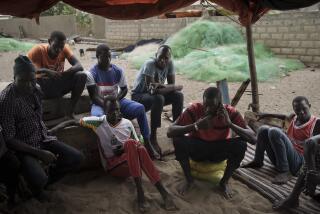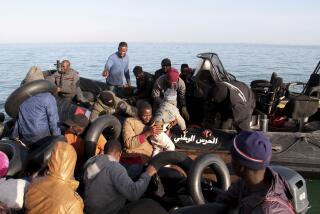Disillusioned Algerian Youth Miss Boat
- Share via
ALGIERS — Kamel heard about the boat taking jobless Algerians to Australia from a friend at Algiers’ port.
The boat and the well-paying job in Australia are illusions, although thousands of young Algerians still talk excitedly about the ship that came to take them to greener pastures but never docked.
Algeria and Australia emphatically deny that a boat ever came. But the fiction persists, a glimmer of hope for young men without jobs, apartments or money whose despair exploded into rage in October, 1988, riots that changed the face of Algeria.
People under 30 form three-quarters of Algeria’s exploding population of 24 million and their anger, calmed but not defused by sweeping democratic reforms, remains a potential time bomb.
“Their numbers and their needs are extremely large, and we have not dealt with them in time,” Youth and Sports Minister Abdelkader Boudjemaa said. “Evidently, not seeing anything come, they despair.”
According to Kamel, the Australian ship docked at the nearby Spanish island port of Palma and hundreds of Algerians traveled over to meet it.
A few months ago a crowd of unemployed youngsters gathered by the Algiers central post office when a van arrived carrying foreigners who began--or were rumored to have begun--enrolling Algerians for high-paying jobs in Australia.
“If the van ever existed, it was probably a scam,” said Michael Smith of the Australian Embassy in Algiers.
“The boat rumor has been going around for years. We still get people, about once a week, calling us to say the boat has arrived and can they please have a visa.”
The country’s official UGTA labor union puts unemployment in the general population at nearly 30%. Among men under 30 who are not either students or in the army for a mandatory two-year service, the figure is probably higher.
A housing crisis means that even those with money have trouble finding an apartment. Marriage, with the exorbitant costs demanded by Arab tradition, is beyond the means of many.
Sports facilities and cultural programs are inadequate. Social, economic and sexual misery prevail, and flight at times seems the only solution.
“I always feel depressed because I can’t get out. I feel like killing myself sometimes,” said Kamel, a 23-year-old law student who doubts that he will find a job after graduation.
Hundreds of young Algerians are believed to emigrate illegally each year to France, swelling its already huge Algerian immigrant community of 800,000. They also illegally enter other European countries and North America.
So many jobless young spend their days and nights standing against the walls of city streets that a slang term has evolved to describe them-- haitistes , a typically Algerian mixture of the Arabic word for wall and a French suffix.
Ironically, Algeria’s young people are among the best off in Africa. They are better fed, clothed, educated and traveled than their counterparts in neighboring Morocco and Tunisia.
A much-prized hard currency allowance that allowed Algerians to travel was withdrawn in 1988.
“We’ve seen the good life. We have tasted the fruit. And then they took it away. That’s why we are disgusted,” said Kamel.
Rioting youngsters who rampaged through the streets of Algiers and other cities in October, 1988, marked the death knell of one-party rule by the National Liberation Front and launched one of the Third World’s few multiparty democracies.
But the young say their lives have not improved much since President Chadli Benjedid’s political reforms led to a flowering of free speech and opposition political parties unprecedented since independence in 1962.
“For years they’ve been telling us it will change. But we’ve seen nothing,” said Abdelkader, a 23-year-old taxi driver.
“If someone came to me at 3 in the morning and told me he would take me abroad to work, I would leave immediately in my pajamas,” he said.
More to Read
Sign up for Essential California
The most important California stories and recommendations in your inbox every morning.
You may occasionally receive promotional content from the Los Angeles Times.













